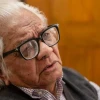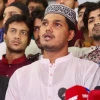After years of anticipation, the Dhaka University campus has awakened to the vibrant rhythm of democracy as voting for the much-sought Dhaka University Central Students' Union (DUCSU) and hall unions began Tuesday morning.
For many young voters, it is their first taste of exercising the franchise free from fear, a moment that blends excitement with history, and personal choice with collective destiny.
The election, being held after six years, has triggered enthusiasm not only at the university but also across the country, as DUCSU still holds a great influence on national politics.
From early morning, voting centres are abuzz with the footsteps of students casting their ballots.
Voting will continue until 4pm across eight polling centres. In all, 39,775 students — 20,873 male and 18,902 female — are set to decide the fate of 471 candidates vying for 28 coveted posts.
The contest promises to be both intense and festive, following 13 days of spirited campaigns that painted the campus in colours of creativity and youthful vigour.
Among the candidates, 48 are battling for the prestigious Vice-President (VP) post, while 19 are in the fray for General Secretary (GS), and 25 for Assistant General Secretary (AGS).
The post of Liberation War and Democratic Movement Secretary has drawn 17 aspirants, while 11 are vying for Common Room, Reading Room, and Cafeteria Secretary.
Fourteen are competing for International Affairs Secretary, 19 for Literature and Cultural Secretary, and 12 for Science and Technology Secretary.
Research and Publication has 9 hopefuls, Sports 13, Student Transport 12, Social Service 17, Health and Environment 15, Human Rights and Law 11, and Career Development 15.
This year, 217 candidates are in the running for the member posts alone, underscoring the sheer scale of the election.
Around 40,000 voters are eligible to cast ballots, making it one of the largest exercises of student democracy in the country.
The air of festivity is matched by the cloak of security.
The Dhaka Metropolitan Police (DMP) has mounted an elaborate security net to ensure smooth balloting. From check-posts at campus gates to regular patrols, from officers donning body cameras to SWAT teams, bomb disposal squads, and intelligence units — every measure has been summoned to safeguard order.
CCTV surveillance complements patrols by special forces, while members of the Rapid Action Battalion (RAB) and Border Guard Bangladesh (BGB) stand on duty.
Numbers reveal the scale of preparation: 1,771 police officers deployed Monday, with another 2,096 joining Tuesday.
To keep the heart of the campus calm, traffic restrictions have been enforced in and around Shahbagh, High Court, Nilkhet, Shahidullah Hall and Polashi roads, urging commuters to take alternative routes.
In an additional step, the DMP has imposed an arms ban from 8 pm on September 8 until 12 pm on September 11.
Vice-Chancellor Professor Dr Niaz Ahmed Khan has pledged to hold the election with “the highest level of transparency — and transparency will be our greatest strength.”
Speaking to reporters on Monday, he acknowledged the challenges but expressed confidence that cooperation among all stakeholders had ensured a fair pathway forward.
In a rare initiative to uphold transparency, vote counts will be broadcast live on LED screens placed outside each polling station.
Chief Election Commissioner Prof Dr Mohammad Zashim Uddin confirmed the arrangement, stressing that openness and credibility are at the heart of this year’s process.
Adding further layers of discipline, the Election Commission has barred bags, mobile phones, smartwatches, electronic devices, water bottles, or any liquid substances inside polling centres.
Meanwhile, to ease mobility on this crucial day, the university is operating a special shuttle service from 7:45 am to 3:50 pm in a circular route, touching the Geology Department, Curzon Hall, Shahbagh, TSC, Udayan School, Teachers' Club, ULAB School and College, Senate Building, and Physical Education Center.

-1757385678.webp)
 Prev Post :
Prev Post :
